The Texas Environmental Awards were different this year, but that did not stop us from celebrating the hard work and achievements of so many Texans to protect the environment we love.
Watch the whole thing here:
Our revamped virtual event began with a warm welcome from longtime Sierra Club supporter, Genevieve Padalecki. The exciting evening included music from four different artists/bands, raffles, and of course, our award winners!
The winners this year were acknowledged by their peers as leaders in their field through innovation, hard work, passion, and general excellence in environmental activism, research, and reporting.
We could not have had such a successful event without the support of our sponsors! A hearty thank you to:
Waterloo Sparkling Water
Patagonia
Syntropy Wealth Management
Tiff’s Treats
Melt Tension
Austin Art of Fitness
Texas Beer Company
Goodpop
Austin Creative Reuse
We are also eternally grateful to our community sponsors:
Sierra Club’s Dallas Group
Ling Zhu
Andy & Julia Balinsky
Sierra Club’s Houston Group
Mary Beth Maher
Sierra Club’s Greater Fort Worth Group
Patrick Murphy
Ellen Buchanan
Chris Evans
Cyrus Reed
Evelyn Merz
Richard Alles
Craig Nazor
Hector Gonzalez
Award Winners
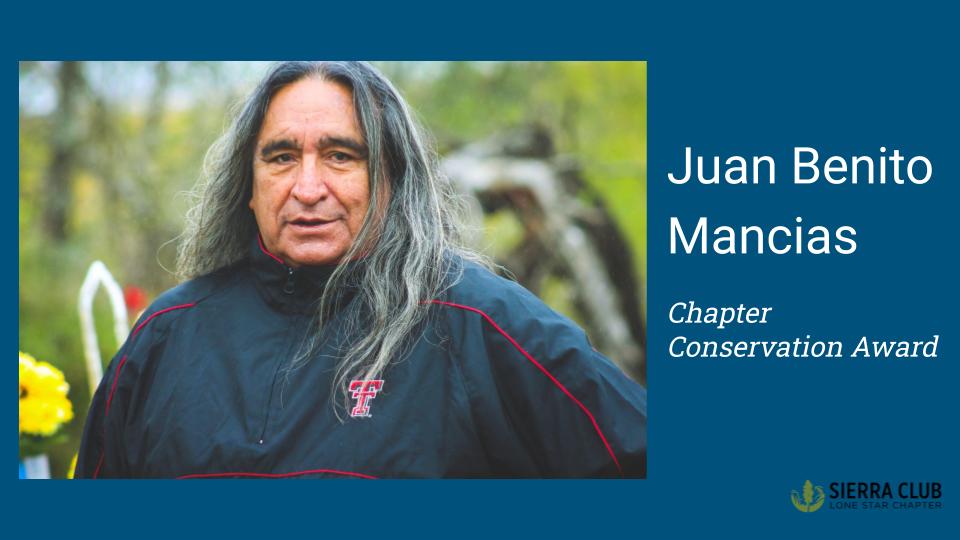
The Chapter Conservation Award, recognizing diligent work on a particular issue, was presented to Juan Benito Mancias, tribal chairman of the Estok G’na people. Juan was recognized for his work as a prominent opponent to the fossil fuel industry and other environmental injustices, both to indigenous people and to all residents of Texas.
As the Chairman of the Estok G’na, or Carrizo Comecrudo Tribe of Texas, Juan has led his people’s opposition successfully against the Apache Corporation to the point of closing their disposal wells, attending every permit hearing in order to challenge them. He has traveled to France to speak with investment banks, convincing PNB Paribas to divest from fossil fuels and withdraw from Texas LNG.
His tireless efforts have stalled the LNG export terminals in the Rio Grande Valley from starting construction in 2017, and to date, they are still struggling to get permits. He and his people have also just won legal standing in their case against the U.S. Government on the wall building in the Rio Grande Valley.
Juan uses his voice on social platforms, guest speaking at conferences and rallies, writes books and op-eds, and uses many other occasions to continually speak out against racism and the genocide of his people, which is deeply connected to environmental issues in Texas.
He has led many marches and direct actions and is occupying a cemetery space to protect the graves and bones of his ancestors from desecration for border wall construction.
He attends every permit and public hearing possible to halt or slow down the granting of land and tax abatements to LNG and oil pipeline companies that destroy their sacred sites and the environment.
He teaches and mentors his people to know and return to their traditional lifeways, in order to decolonize and reconnect with their culture and tribal identity. He’s written a decolonization program and frequently teaches it to the public to learn to change the mentality of our society.
He never stops fighting for the protection of his people, his ancestral lands, and his tribal culture and identity. For this work, we are proud to honor Juan Mancias.
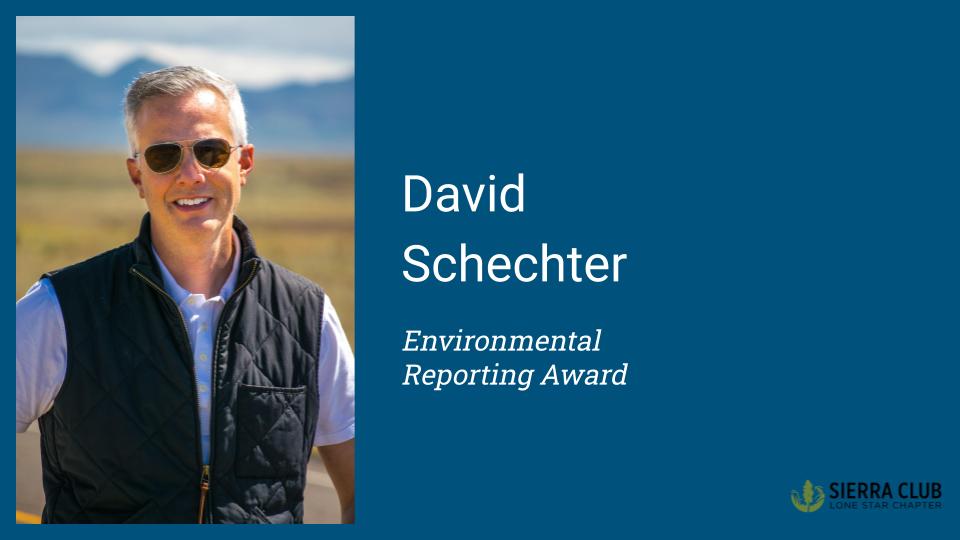
The Environmental Reporting Award, given to a reporter in any media who has produced a series or single report which has provided exceptional coverage of an environmental issue, was presented to David Schechter, co-producer, and co-creator of Verify Road Trip at WFAA-TV in Dallas. With Verify, David takes real people on the road so they can ask their own questions, see what he sees, and reach their own conclusions.
Verify was designed to provide viewers with an approach to storytelling that is significantly different from what local news has traditionally offered.
His most impactful and important Verify documentary to date is about climate change. David takes a climate skeptic with him to Alaska where they examine what scientists know and how they know it. This is a 42-minute documentary that delves deep into the science of climate change and interviews several experts.
Here's a clip:
Verify also took him to west Texas to verify if the land beneath the great Texas oil patch is sinking in the documentary "Is Texas Sinking?". Conclusion? Yes, it is.
Other environmental documentaries include "Are Wind Turbines Killing Birds? and “Don't Get Me Started on Cats!" and "Does Conservative Texas Actually Lead the U.S. in Green Energy?"
David is a two-time winner of the national Murrow Award for documentary, three-time Scripps Howard National Journalism Award winner, recipient of the Walter Cronkite Award for Excellence in Political Reporting, and a James Beard Award Finalist.
He is a University of Michigan graduate, a patented inventor, and a Poynter Institute Ethics Fellow. And now a Texas Environmental Reporting Award winner!
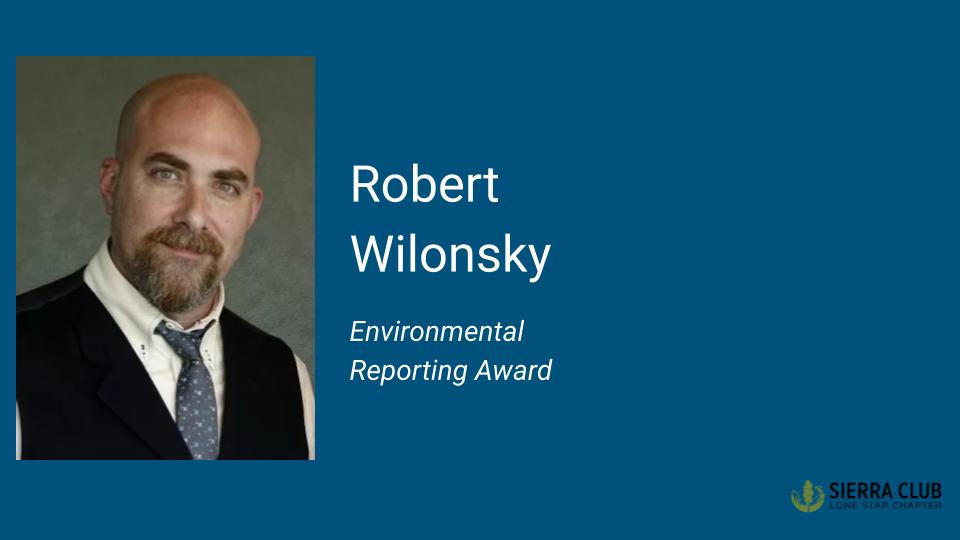
This year, we had two Environmental Reporting Award winners. The second award was given to Robert Wilonsky.
Robert Wilonsky has worked for the Dallas Morning News, Dallas Times-Herald, the Dallas Observer, the Los Angeles New Times, and the Dallas Morning News. He has served as a feature writer, music editor, film critic, sports columnist, and pop culture editor.
He supervised the launching of the Dallas Observer's weblog, "Unfair Park." and has been published in "Salon" and "American Way" as well as appearing as a guest critic on "At the Movies'' with Ebert & Roeper.
Robert has been called the "Passionate and Articulate Conscience of Dallas." His journalism in North Texas over the last twenty years has been crucial in raising public awareness about issues of utmost importance to North Texas citizens.
As a fixture at Dallas City Hall, Robert is also commonly found roving the trenches where injustice oozes its ugliness. His activism has been a critical factor in moving North Texas governments towards more equitable and just social and environmental positions.
Some of the topics of Robert's key projects about environmental and social injustice in Dallas include the seventy thousand ton mountain of used composition shingles known as Shingle Mountain, the Lane Plating Superfund Site at the former Freedmen settlement of Joppe, and the only unincorporated community in Dallas County, Sandbranch, which was founded around 1880 but still struggles to obtain municipal water while dealing with contaminated private wells.
The Music, Y’all!
This year’s awards event had several great musical acts throughout the night. The first performers were Patricia Vonne and Aubrey Hays.

Check out more of Patricia Vonne here.

Check out more of Aubrey Hays here.
...and it was back to the awards!
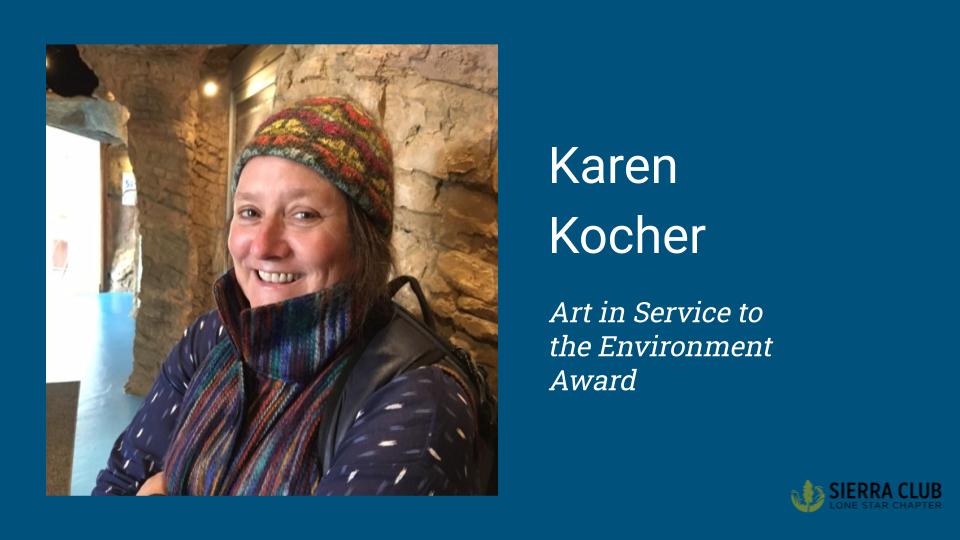
The Art in Service to the Environment Award, given to an individual or group for an outstanding work of art in any medium or discipline in service to the environment, was presented to Karen Kocher, a documentary filmmaker from Austin, whose work highlights the history, science, and culture of Barton Springs and the Edwards Aquifer.
Her project, the “Living Springs” includes over 30 films, and has aired on Austin PBS, KLRU, as well as being featured as part of the Splash! Exhibit at the Barton Springs swimming pool. This exhibit reaches tens of thousands of adults and children each year as they visit the Springs while helping to spread the message of water quality protection beyond Austin and Texas.
Karen’s work is a key part of building a culture to protect the springs, a protection that envelopes the waterways and the watersheds that feed them, leading to support for land use and water quality protections.
Her dedication dates back to her graduate student work documenting the Save Our Springs movement. She is currently expanding her focus, in an hour-long film for PBS titled “Origins of a Green Identity.” Additionally, she’s a part of a new interactive exhibit called Barton Creek Time Stream, celebrating over 50 years of environmental stewardship.
Environmental Justice Award - Olinka Green, Brê Jacks, and Marcus X Russell
The Environmental Justice Award, given to the individual(s) or organization that has done outstanding work toward identifying and addressing environmental problems that have a disproportionately adverse effect on communities of color and/or low-income communities, was presented to three joint recipients this year, who all work with the Poor People’s Campaign, an organization founded from the work of Dr. Martin Luther King, Jr. Our awardees were Olinka Green, Brê Jacks, and Marcus X Russell, all from the Dallas area. Last year, they helped organize the Eco Devastation Tour of Joppe, Shingle Mountain, Lane Plating Superfund Site, RSR Lead Smelter Site, and Sand Branch. This was a wide-ranging collaboration that included Sierra Club, community organizations, churches, and political leaders.
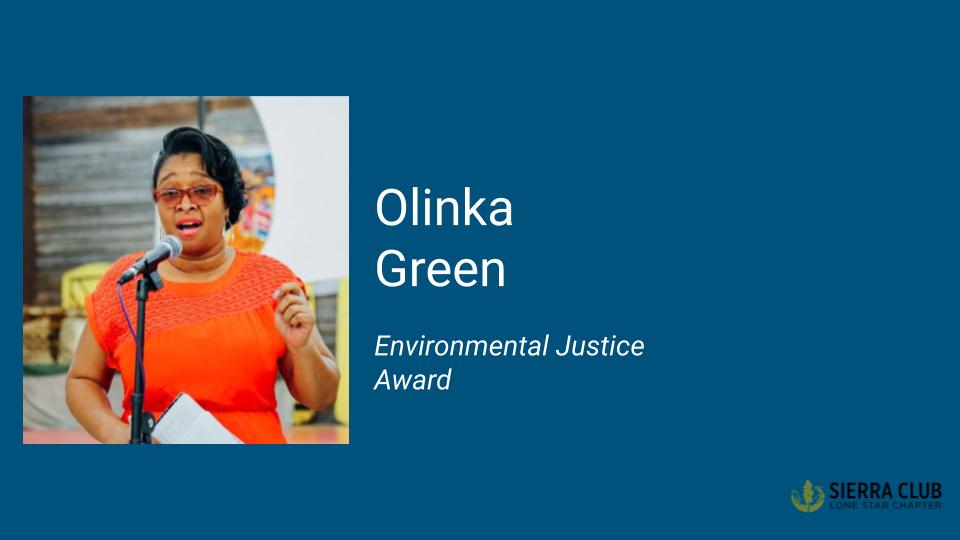
Our first recipient to be honored was Olinka Green. Olinka has been organizing and protesting for justice for decades, starting as a high schooler helping get residents tested for lead. She has overcome a history of poverty and police brutality to become a fearless campaigner for justice, in cities in and out of Texas.
She is a gifted speaker and has advocated with elected and government officials on behalf of her neighbors and is the leader of the neighborhood group fighting for the cleanup of the Lane Plating Works Superfund site. She also visits different cities with advocacy groups, talking about issues, and sharing her survivor’s stories.
In 2019, Olinka conceived and helped lead various environmental justice and women’s equity activities in Dallas, including a bus tour of local ecologically threatened sites and a forum about police violence against black women.
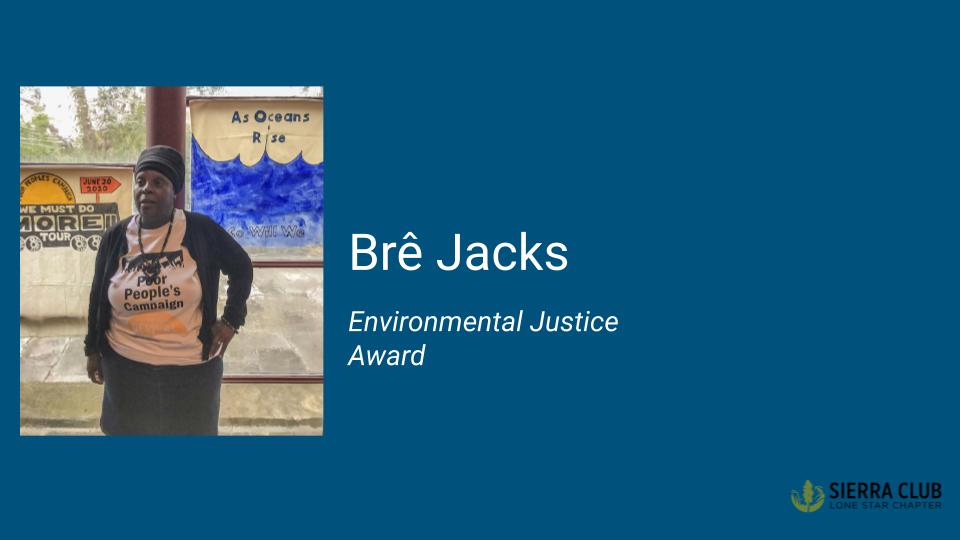
Our second recipient was Brê Jacks. Brê is the organizing power behind the tours and marches conducted by the Poor People’s Campaign. If Olinka Green can be considered the inspiration for big events like tours and marches, Brê Jacks can be thought of as the Field General who takes care of details required for success.
Brê is a Special Education teacher for grades one through seven. Seeing inequities in schools ignited her passion to work in her community and elect school board members who would be more representative of local neighborhoods. This experience was discouraging as she saw newly-elected members become co-opted by special interests.
Brê turned her attention to advocating for criminal justice and rational health care. As a member of the Texas Organizing Project, Brê publicizes how people of color with a record of petty misdemeanors can face societal stigmas in society that prevent them from getting employment and health care.
Brê recently became a leader in the local chapter of the Poor People's Campaign where she was a key planner for the 2020 March on Washington before it was canceled due to COVID-19.
Brê is an inspirational musician with a beautiful voice, and she knows just what to sing and how to sing it; whether leading a bus tour or a climate change presentation.
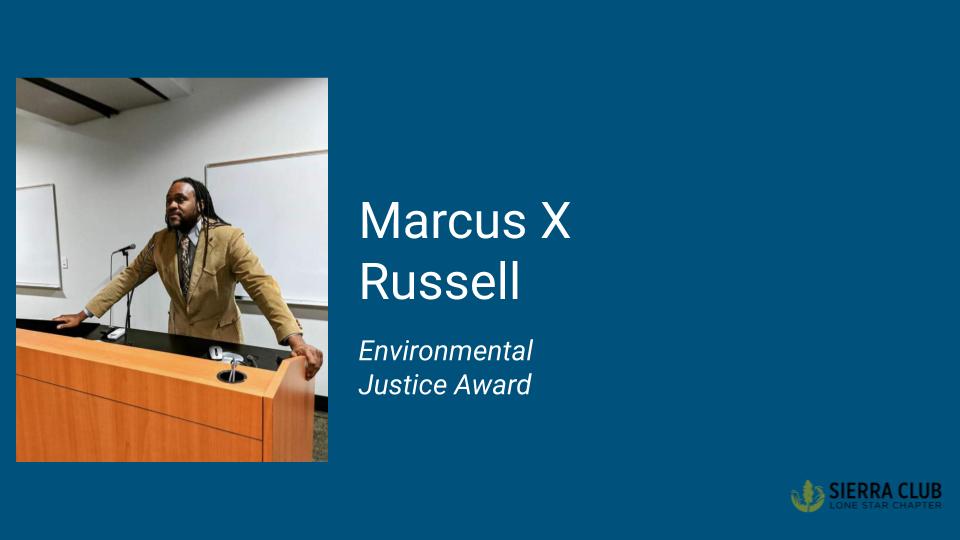
The third co-recipient of this award was Marcus X Russell. Marcus is the creator and leader of Commissary Is Very Necessary, an organization providing health care, stability, education, and empowerment to children, youth, and families in the most impoverished neighborhoods of Dallas-Fort Worth. Commissary Is Very Necessary stays close to people in the affected communities to understand their needs and places special emphasis on keeping children out of the cycle of poverty and serving families with immigration issues. In March 2020, they published a COVID-19 resource guide to assist people with limited access to the internet.
Marcus grew up as a champion of disadvantaged people under the tutelage of his mother, Shirley, who was a justice activist. He recently developed a Community Garden in South Dallas honoring Shirley. Marcus has spent his entire life fighting for cultural and environmental justice in the poorest zip codes of Dallas which have the greatest pollution, the greatest health issues, the highest unemployment, and the highest crime rates.
The Dallas Sierra Club has worked with Marcus on several occasions over the past year on environmental projects including the 2019 Ecological Devastation Tour, remediation of the Highland Hills Superfund Site, planning for the 2020 Poor People's March, and special help for impoverished communities as they battle COVID-19.
Marcus also works with a variety of Dallas organizations including Earth-X, Climate Reality, Lone Star Human Services, The American Black Cross, and local churches.
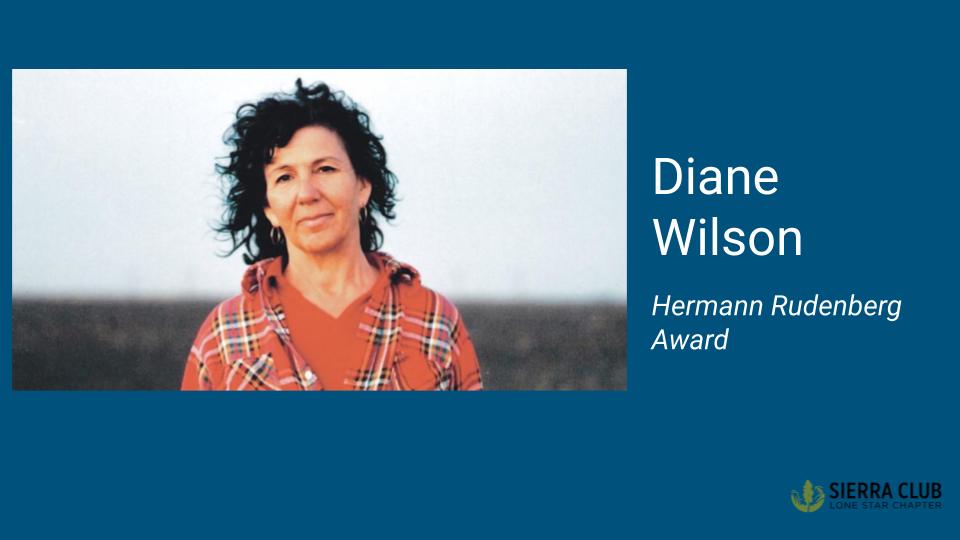
The Hermann Rudenberg Award, given to individuals who have worked diligently for the protection of Texas coastal resources, was presented to Diane Wilson.
Diane is an eco-warrior in action. As a fourth-generation shrimper, Wilson began fishing the bays off the Gulf Coast of Texas at the age of eight. By 24, she was a boat captain. In 1989, she read a newspaper article that listed her home of Calhoun County as the number one toxic polluter in the country.
She soon set up a community meeting in the town hall to discuss how the chemical plants were impacting the bays, thus beginning her life as an environmental activist. Threatened by thugs and despised by her neighbors, Wilson insisted the truth be told, and that Formosa Plastics stop dumping toxins into the bay. Her work forced Formosa Plastics to sign a zero-discharge agreement in a $50 million settlement and encouraged neighboring Alcoa Chemicals to do the same.
Since then, she has launched legislative campaigns, demonstrations, and countless hunger strikes to raise awareness for environmental and human rights abuses. Her book, An Unreasonable Woman, A True Story of Shrimpers Politicos Polluters & the Fight for Seadrift Texas, chronicles her career in detail.
Diane is the Executive Director and waterkeeper for San Antonio Bay Estuarine Waterkeeper. She’s been honored with a number of awards for her work including the National Fisherman Magazine Award, Mother Jones's Hell Raiser of the Month, Louis Gibbs' Environmental Lifetime Award, Louisiana Environmental Action (LEAN) Environmental Award, Giraffe Project, Jenifer Altman Award, Blue Planet Award and the Bioneers Award.
She is also a co-founder of CODEPINK, the Texas Jail Project, Texas Injured Workers, Injured Workers National Network, and continues to lead the fight for social justice.
Before more awards were presented, we took another awesome music break with Tony & Camille, followed by Ben Balmer.

Check out more of Tony & Camille here.

Check out more of Ben Balmer here.
...then it was back to the awards for the final round!
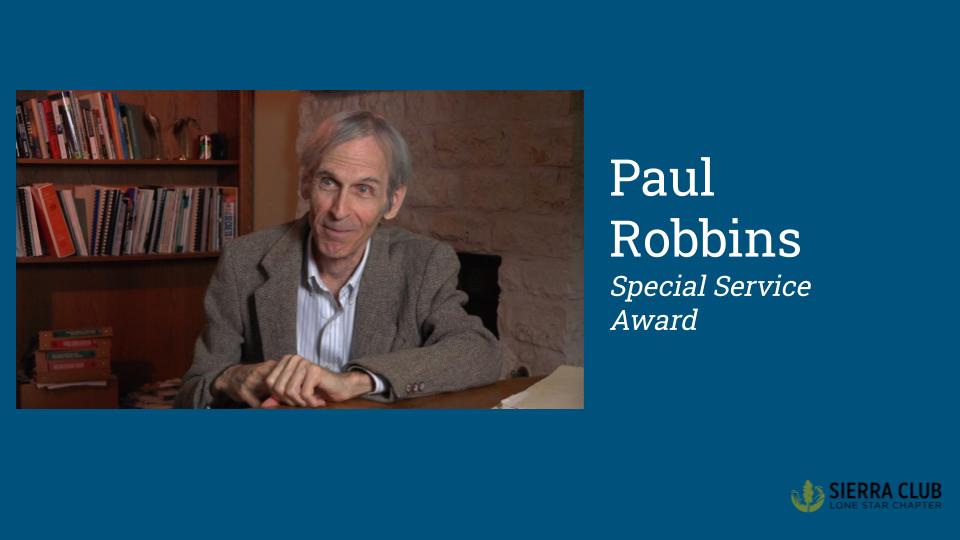
The Special Service Award, given to a person who has performed a special service to the Sierra Club or to environmental protection, was presented to Paul Robbins. Paul Robbins has been an environmental analyst, author, publisher, and advocate in the Austin area since 1977.
In the early 1980s, he helped start the City of Austin’s nationally renowned clean energy programs. He has won awards for individual achievement from the City of Austin and Keep Austin Beautiful. In 2007, the Austin City Council named a downtown district “chilling station” in his honor. In 2010, he was voted Best Environmentalist by the Austin Chronicle reader’s poll. He is frequently seen at Austin City Council or boards and commissions giving detailed, thoughtful, and robust testimony.
Paul is well known for his research, writing, editing, layout, printing, distributing, and fundraising for the Austin Environmental Directory, now in its tenth edition. The Environmental Directory is a broad sourcebook about environmental issues, products, services, and organizations in Central Texas.
One of Paul's recent projects has been to try to encourage the city of Austin and Texas Gas Service to adopt a conservation demand pricing structure like Austin Energy. He has also done wide-ranging reporting on conservation questions for non-profits and agencies, including the Hill Country Foundation, Public Citizen, Save Our Springs Alliance, SEED Coalition, Texas for Public Justice, and the City of Austin's Energy Management Department.
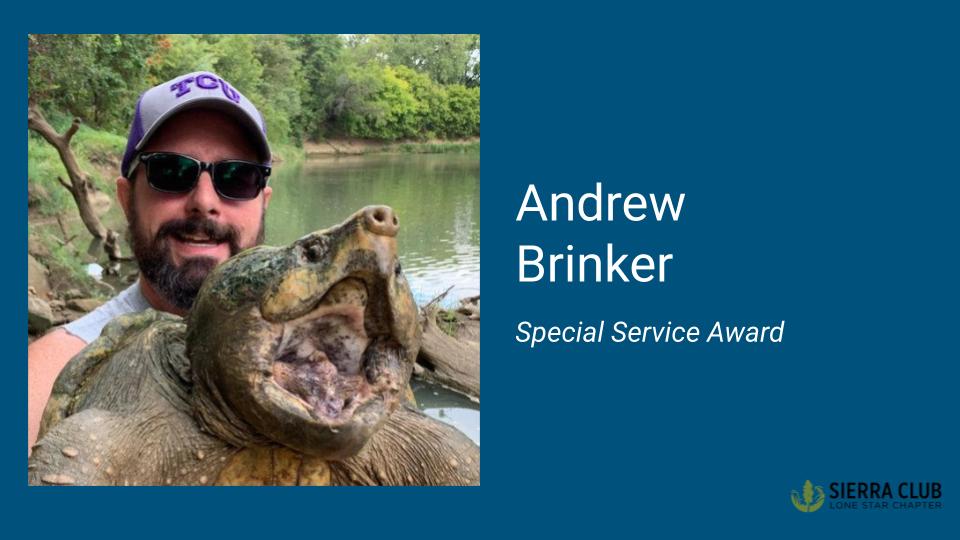
We awarded a second Special Service Award this year, presented to Andrew Brinker, an environmental science teacher at Paschal High School, Fort Worth’s largest Title 1 school.
Andrew prefers a hands-on approach to his lessons. His environmental science classes start each year with a month-long eco-column lab, in which students create terrariums out of two-liter bottles, soil, insects, and plants.
In 2017, he developed the Trinity River Turtle Survey with the support of the TCU College of Education, after securing permits from Texas Parks and Wildlife. The program has collected data from over 1,000 turtles from six species. This ongoing lesson draws students to the river at least one weekend a month collecting data on the resident turtles.
Take a closer look:
Andrew also takes his students on field trips to the Fort Worth Botanical Gardens, the Village Creek Wastewater Treatment Plant, and Texas Christian University’s Student Research Symposium. On these trips, his class interacts with college students and witnesses college-level curricula.
For 14 years, Andrew has sponsored the school’s Science Club and University Interscholastic League Science Team, which has captured national, state, and district championships, including two all expense paid trips to the National Science Bowl in Washington, D.C.
Andrew was also recently named the 2020 Environmental Educator of the Year by the Texas Commission on Environmental Quality. Congratulations, Andrew!
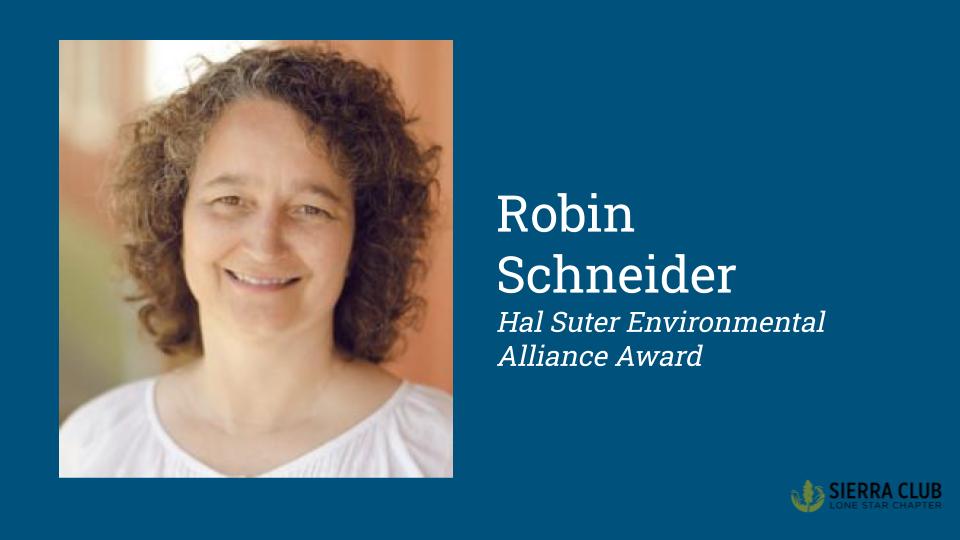
The brand new Hal Suter Environmental Alliance Award, given to the person who has helped further environmental goals through collaboration, was presented to Robin Schneider, Executive Director of Texas Campaign for the Environment.
Robin started her activist career in high school. She was a 17-year-old canvasser for the Equal Rights Amendment, raising funds door-to-door to assist pro-E.R.A. candidates.
During college, she led a campaign that stopped a plan to drill for oil on the UCLA campus. While at UCLA, she also led a delegation of 18 college students to Florida in 1982 to campaign for the E.R.A.
Robin was selected for a legislative fellowship in 1983 and worked on environmental policy issues. She then gained campaign experience leading a voter registration campaign that signed up over 17,000 voters in less than four months.
Robin spent the next eight years working for a women’s rights group and developing winning strategies for lobbying and electoral campaigns.
Robin joined the Texas Campaign for the Environment in 1997. Under Robin’s direction, T.C.E. took a leading role in the campaign to close the Grandfather Loophole in the Texas Clean Air Act, for which she was dubbed the “Best Advocate for Breathers” by The Austin Chronicle.
T.C.E. played a key role in successfully pressuring Dell, Apple, Samsung, and other TV companies to take back their obsolete products and support producer take-back policies. In 2004, T.C.E. won a second “Best of Austin” award (in conjunction with Dell) for “The Best New Partnership” from The Austin Chronicle. Robin was named a “Green Giant” by Austin Monthly in April 2007.
Under Robin’s direction, TCE has also been working with landfill neighbors to impact local trash and recycling issues and statewide legislation. She was an early advocate for Zero Waste policies and helped shepherd the adoption of Austin’s Zero Waste goal and plans.
Robin has also played a key leadership role alongside Sierra Club staff and its allies in the work to address the climate change crisis by stopping coal-fired power plants and transitioning off fossil fuels. She brought T.C.E.’s door-to-door canvassing power to those fights and also joined in key lawsuits, media campaigns, and legislative training and lobbying efforts.
Robin has collaborated in the leadership of Texas regional alliances — the Alliance for a Clean Texas, the Permian Gulf Coast Coalition and national alliances, Break Free From Plastics, Stop the Money Pipeline, and Insure Our Future.
Robin and T.C.E. are currently supporting powerful new outreach and organizing in the battle of the Coastal Bend against a major industrial build-out in the Corpus Christi area. TCE is also supporting staff and volunteer efforts in North Texas, Central Texas, the Greater Houston Area, and now the Permian Basin.
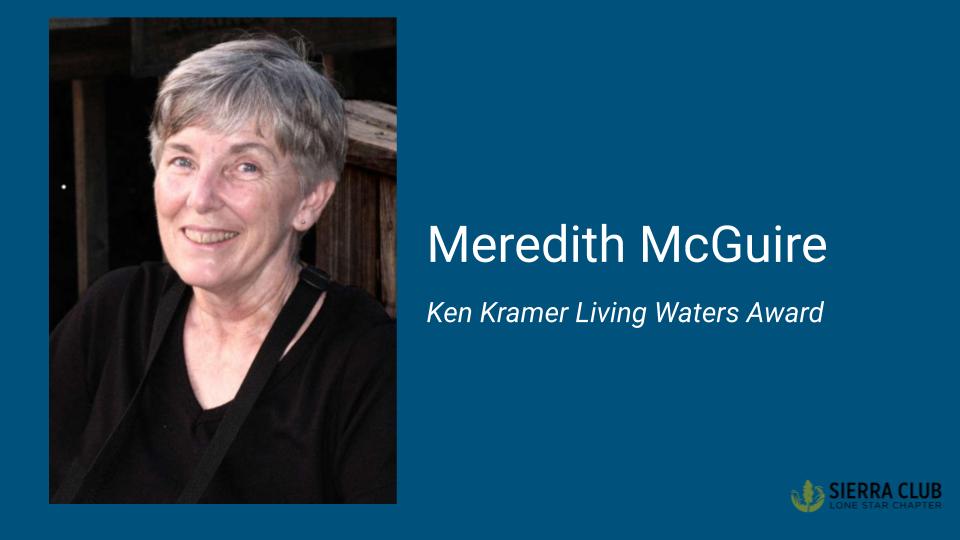
The Ken Kramer Living Waters Award, created to honor Ken Kramer's thirty years of service as the Director of the Lone Star Chapter and his special dedication to the issues of water quality and water conservation over the course of his career, was presented to Dr. Meredith McGuire.
Meredith is a Professor Emerita of sociology and anthropology at Trinity University where she taught courses on the connections between human health and the health of the natural environment.
She is co-chair of the Conservation Committee of the Alamo Group of Sierra Club; the former President of both the Society for the Scientific Study of Religion and the Association for the Sociology of Religion; and is also a specialist in environmental sociology and in the sociology of health and illness.
She writes environmental conservation columns in San Antonio publications and is a full-fledged activist on issues like climate change, air and water pollution, affordable housing and displacement, unjust utility rates, and intergenerational climate justice.
Meredith has served with San Antonio's Climate Action and Adaptation Planning process on the Water and Natural Resources Technical Working Group and has been particularly active with conservation efforts focused on the San Antonio Water System. She has also worked to strengthen conservation aspects of the San Antonio Sustainability Plan while opposing the Vista Ridge Pipeline.
And with that…
...our 2020 Texas Environmental Awards was a wrap. This year’s event could not have happened without the hard work, creativity, and dedication of Natalie Martinez, Chapter Executive Coordinator, in addition to the volunteers on our Chapter Awards Committee: Aaron Waters, Jillian Vazquez, Andy Balinsky, Derek Eckert, and Matt Johnson.
To all of our esteemed awardees, you’ve made this world a better place, and we’re so very thankful for all that you’ve done. Please keep it up, future generations depend on your passion and innovation. Your efforts each help us walk a path that leads towards a brighter tomorrow.
Keep your calendars open for the 2021 Texas Environmental Awards! The tentative date will be October 2, 2021! Nominations will open on May 1, 2021.